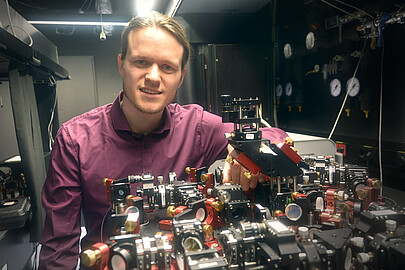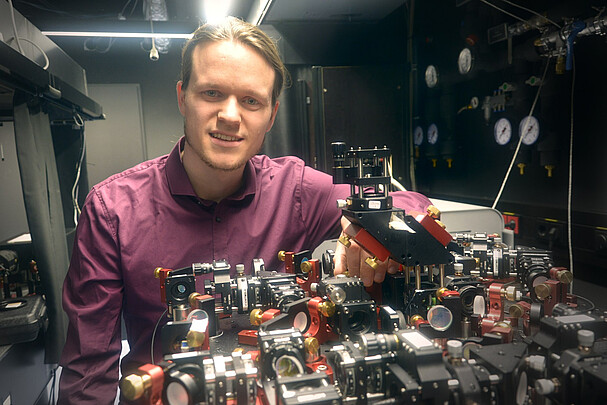| Lectures and Tutorials | |
|---|---|
| Lecture Introduction to Nanophysics | 4 SWS |
| 2 SWS | |
| Group Seminars | |
|---|---|
| Group Seminar Quantum Engineering | 2 SWS |
| Group Seminar Nanodevices for Energy Storage | 2 SWS |
| Laboratory Classes | |
|---|---|
| Labor Class Growth und Characterization of Nanostructures | 2 SWS |
| Labor Class Optical Characterization of Nanostruktures | 2 SWS |
| Labor Class Nanomaterials in Energy Storage Devices | 2 SWS |
Theses and open positions
Bachelor and Master theses
We offer various exciting possibilities for Bachelor and Master students to join our group and pursue their thesis. Possible thesis topics that fit within our research topics are personally discussed and decided together. The main research areas for a thesis are:
- Epitaxial growth as well as micro- and nanofabrication of semiconductors
- Low teperature spectroscopy of low-dimensional quantum systems
- Quantum optical measurements as well as measurement control and data analysis with Python
Our group offers an international work environment and is embedded in the scientific community at our university, in Germany and worldwide. We support a fair and cordial teamwork with core values such as honesty and openness as well as commitment and determination.
We are looking for candidates with the following profile:
- Background in physics, nanotechnology or optics
- Good / excellent marks
- Ability to work independently
- High level of motivation
- English language skills
- Teamwork
- Helpful: Python programming skills
Possible thesis topics
-
Optical positioning of semiconductor quantum dots
Important quantum optical properties of integrated quantum dots like, e.g., the spontaneous emission rate enhancement, rely heavily on the spatial position inside nanophotonic structures. In order to assure a high quantum yield of the device, precise optical positioning of the quantum dots across the whole chip is necessary and should be optimized by you. Especially experience with Python will be helpful for this task.
-
Optical characterization of quantum photonic devices
Fabricated photonic nanostructures have to be optically characterized with regard to their efficiency-wavelength dependence and their polarization-dependent properties. Your tasks will include building an optical setup, controlling/automizing the measurement equipment and analyzing the results.
-
Automated spectroscopy of semiconductor quantum devices
Realizing elaborate semiconductor quantum devices requires efficient spectroscopic characterization. Micro-photoluminescence measurements are performed to obtain spectral information in dependence of laser power and wavelength, sample position or the emitted polarization. Your task will be to fully automate these measurements in a python based laboratory management framework.
-
Wet chemical etching for strain-tunable photonic devices
Novel hybrid devices based on piezoelectric substrates to nanophotonic structures are the motivation for this project. Such devices require the bonding of large semiconductor-nanomembranes with piezoelectric actuators. Your task will be to investigate wet chemical etching processes in the cleanroom, which will ultimately enable the fabrication of the envisioned structures.
-
Fabrication of nanophotonic structures
Novel semiconductor photonic nanostructures (e.g. 2D topological resonators) are of great interest in research since they can boost quantum optical properties of integrated single-photon emitters. You will be working in a cleanroom environment with the latest fabrication facilities including electron beam lithography and reactive ion etching.
-
Simulation of photonic nanostructures with integrated quantum dots
Novel nanophotonic quantum devices based on semiconductor quantum dots need to be understood theoretically to provide starting parameters for the experiments. Your task will be to perform Finite-Difference Time Domain (FDTD) simulations of these nanostructures with the state-of-the-art simulation software Lumerical for that goal.
-
Quantum optical measurements with single and entangled photon emitters
Semiconductor quantum dots are excellent sources of non-classical light. To investigate their quantum optical properties like photon anti-bunching or the entanglement fidelity will be central to your tasks. These include working in a state-of-the-art optical lab and automating/analyzing the obtained results.
-
Data analysis for the Niedersachsen quantum link
In a joint effort with our partners at the PTB (Braunschweig), a fiber testbed between the two cities is being set up for quantum communication purposes. Your task will be to understand the critical parameters in quantum key distribution experiments and to develop methods for analyzing the future experimental data using Python.
Contact


30167 Hannover


Postdoc and PhD positions
Within the research grants such as "MiNet", "SQuaD", or "QR.X", Postdoc and PhD positions are available immediately in the group of Prof. Dr. Fei Ding in Leibniz University Hannover.
Details can be found here.
Contact
30167 Hannover
